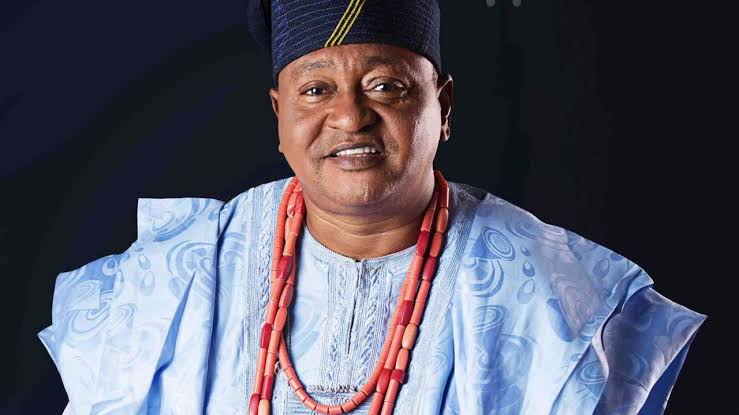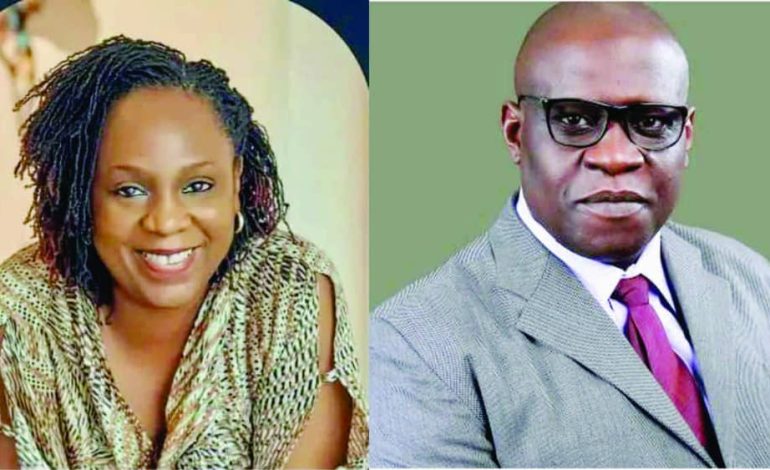CORA: ‘Why we are obsessed with the idea of setting up libraries’
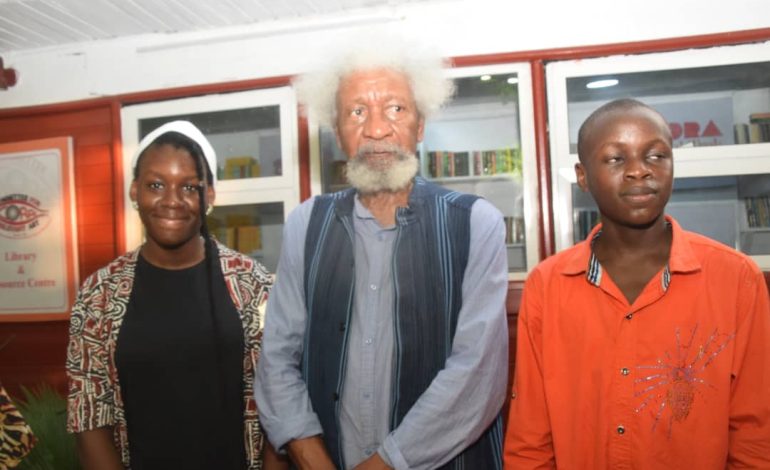
* Breakout of Internet jail for true enlightenment, personality liberation, Soyinka charges netizens
* CORA declares 2024 Soyinka Year as he turns 90
By Godwin Okondo
“THE idea behind this goes back a long way, to the inception of the Lagos Book and Art Festival in 1999, in our eighth year of existence. It was a little high-minded. The nation had just returned to democracy and we thought that it needed a highly literate populace to engage with the norms of the popular vote.”
That was how Secretary of Committee for Relevant Art (CORA). Mr. Toyin Akinosho, welcomed guests to the sneak opening of CORAVille – CORA Library and Resource Centre, located at the serene ambience of Freedom Park, on 1 Broad Street, Lagos, a former colonial prison transformed into a vibrant cultural hub. However, it was the Chairman of CORA Boad of Trustees’, Chief Kayode Aderinokun, who set the tone for the event, when he explained its concept and philosophy. But he first acknowledged Nobel laureate Prof. Wole Soyinka, who he said has probably done a lot more for the country than even the elected leaders.
According to Aderinokun, “The whole concept of having a library and resource centre here is to create a hub that will take young people off the streets. Some of our biggest problems is actually management and transfer of values between the generations. We haven’t done too well in that area. We see some new developments that work in our favour. We have a physical space here, and it has its limitations. How many people can we accommodate here? But then, technology came to our rescue. So, this is a physical, symbolic space that brings all of us together, but we are actually aspiring to set up an e-library that has a much bigger capacity to deal with some of the problems we have today. The library is just a symbolic location.
“In terms of archiving, we have been so poor. Prince Yemisi Shyllon is doing so much in that area, gathering valuable historical material of knowledge. So, we want to do our own small bit of archiving, and we think that even this small centre could be for the development of communication of various types. I just finished an interview on the radio now and they asked me a question: what is our aspiration? Seriously speaking, our aspiration is to touch as many lives as possible. On the board and management of CORA, we have all types of skills that we need to actually harness, but we’ve labelled ourselves as non-profit, which creates a problem for us. We don’t want to make profit, but at the same time, we need to sustain these goals and objectives. I trust that members of the board of CORA are shaking heads in agreement. We will put heads together and find ways to go about it. We’ve been in existence for over 25 years, and that same zeal and passion that have brought us thus far will take us farther. It’s a model that we want to establish and reinstate, that would survive and go beyond us. We use opportunities like this to talk to organizations and government, individuals of like minds to come around and support this our small endeavour. With the likes of Prof. Wole Soyinka in our corner, I’m sure we will do better than we are doing now.”
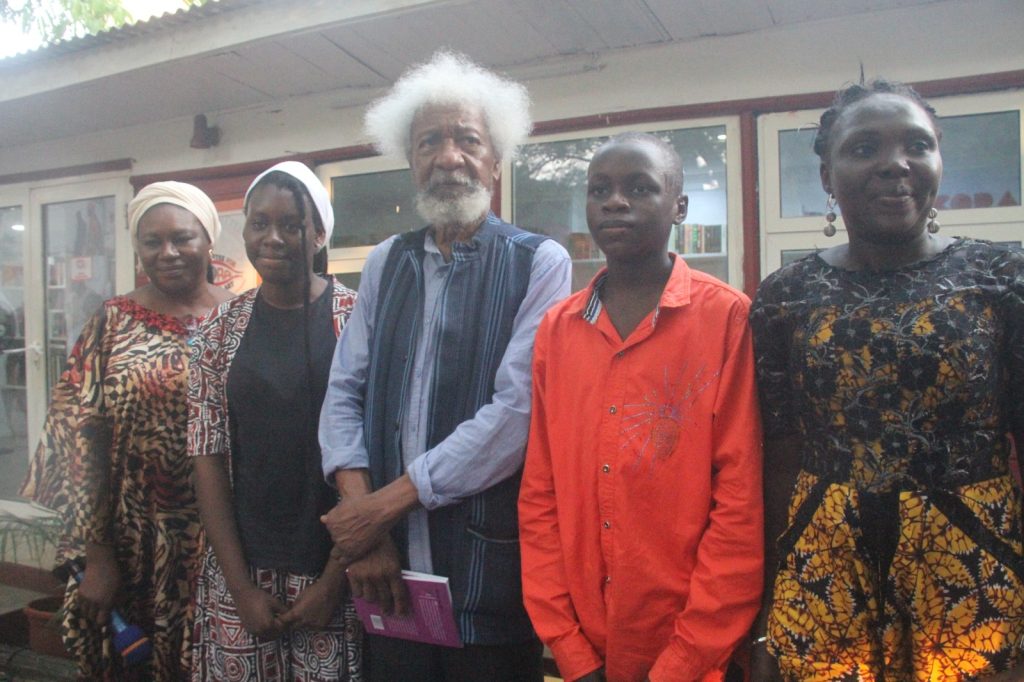
Mrs. Shitta-Bey and her teenage daughter and author of SEE, Munirat Shitta-Bey (left); Prof. Wole Soyinka; author of Lucy, Mummy’s Pet, Roland Efe Kalegba and his mother, Mrs. Kalegha at the event on Sunday, January 14, 2024, at Freedom Park, Lagos PHOTO: ABIODUN OMOTOSHO (www.theforesight.com)
CORA board member and stage matriarch, Dame Taiwo Ajai-Lycett, did not only commend Soyinka, but also tasked him on what mothers need to do to get their children better educated. However, Soyinka did not only offer solutions, he turned on netizens, as has become his fare of late and lambasted them for being too lazy to seek alternative narratives other than what they have been fed and then terrorising others into submission. He advised them to open themselves up to new ideas and concepts like the CORA Library and Resource Centre and breakout of their mental prison.
“I think I want to ask our father, Prof., what more can we do to get women to get their children to read?” she asked. “How many of them come to places like this? How many of our people are reading? Even our leaders don’t seem to be leaders, because from what we see them do, they’re semi-literates. What can we do? It’s a dire situation we are in. I’ve just seen a (drama) sketch of love versus materiality, and I couldn’t feel the impact of love: all these things that you can get from reading, when you can be tenderized by reading, when your mind can be opened up to navigate the world. Prof., what can we do to help our people to get educated?”
But in his characteristic manner, Soyinka threw Ajai-Lycett a reposte to her query, when he told her, “I was invited to be a guest of honour, which means I’m supposed to sit down and do nothing, and then you come and pose a monumental question and you expect me to offer you a solution? I didn’t come here prepared for anything and I refuse to be commandeered without notice or contract. What I’m going to do is collaborate with you on any effort because it’s a multi-directional problem, and I agree halfway with you when you referred to the majority of our upcoming generation being semi-literates; they’re illiterates. The only literacy they have is the literacy of Internet, the lowest form of social media. When I say they are illiterates, I don’t mean to disagree with you. I’m just stating the real fact. We are breeding a generation of illiterates, not just in terms of reading, but mentally illiterates, incapable of retaining a concept in their mind, not even for one microsecond.
“One of the solutions is to find ways of attracting them away from their lazy encounters with the world of the narrative. It’s a dangerous situation. They’re taking over the narrative and terrorizing those who don’t want to correct them, to direct them in the direction of other options. So, it’s not a question of brainwashing; it’s just saying getting them to open themselves to alternative narrative, and initiatives like this create excellent beginnings. So, we find ways of creating more and more of this nature, and find ways of bringing them to understand that these are not traps. We know that this is built on a former prison, but it’s being transformed in a very magnificent way. The theatre was where they used to hang people, but that’s the place that has been chosen to disseminate the works of imagination of their own peers and generation.
“So, we tell them things like that and they come and see for themselves, and even if it’s a prison, there’s something called jailbreak. They can break out of jail and go and do other things. I assure you that it is not a prison. On the other hand, it is a gateway to true enlightenment and personality liberation. Don’t be frightened by the name of this, CORA, ‘relevant arts.’ I’m appealing now to those who are going to donate books. Don’t start looking for books which are relevant. Relevant or irrelevant, just bring the books, and we will know how to make those works relevant.”
CORA partner organisations like the Network of Book Clubs and Reading Promoters in Nigeria (NBRP), Association of Nigerian Author (ANA), PEN International (Nigeria Centre), Unchained Vibes Africa (UVA), among others, were there to lend support
NBRP President, Mr. Richard Mammah, commended CORA for its progressive efforts in expanding the reading space with the addition of a library and resource centre, noting, “We will continue to support CORA, even as it pushes this. One of the things we will do with CORA, ANA and others on March 7, 2024 is the second edition of the Lagos Book Walk. We had the first one in Ikeja last year and we went to the state government and gave them the Lagos Book Stakeholders Charter of Demands, asking for very simple things: two libraries in the 57 LCDAs in Lagos State, run by the state government and another two run by the LCDAs themselves, which gives a total of 228 reading spaces in the Lagos metropolis and it’s extensions. We gave those proposals and we’ve been trying to follow up on them and we hope we will get there someday.
“But we also know there are private organizations, NGOs and groups, of which CORA numbers as a major stakeholder. So every year, we will hold that walk. The first was in Ikeja and the second is coming here – Lagos Island. We are going to be walking from Falomo round about to Freedom Park, and the third will be holding in Ikorodu, and the fourth in Badagary. We are walking advocacy for the book and we are privileged to have a partner like CORA, and we are very excited at an event like this. We want to see the other libraries and dreams that CORA has. Nigeria must have a proper reading culture. We enjoyed it back in the day and we would still enjoy it going forward with all our efforts and opportunities.”
President of PEN International (Nigeria Centre), Dr. Folu Agoi, expressed happiness at bravery of CORA for fulfilling an old desire to have a library, a feat he described as commendable. He used the occasion to berate The Nigeria Police for criminalising ‘We No Gree for Anyone’ slogan that has gained currency in the country in shortly after new year festivities, saying such censorship has no place in a democracy, where there’s freedom of speech and expression. He urged the police to rescind such draconian edits that have long been consigned to the dustbin of history.
Prominent art collector and founder of Yemisi Shyllon Museum of Art, Pan-Atlantic University, Lagos, Prince Omooba Yemisi Adedoyin Shyllon, recalled the proliferation of libraries in the Lagos metropolis while growing up, but lamented the disappearance of libraries over the years. He did not only commend CORA for the new library but offered his commitment to the project.
“As I sat down here, my mind went to when I was a boy,” the engineer and lawyer said. “In Lagos, there were five libraries. There was the Central Library next to CMS, and there was one at Yaba next to St. Agnes bus stop, and there was one called Advanced Library next to Our Lady of Apostles. There was the National Library. I employed some of the young ones and they are not literate. They can’t write any longer and if you challenge the young ones these days to solve a mathematical problem, they reach into their pockets to use a calculator.”
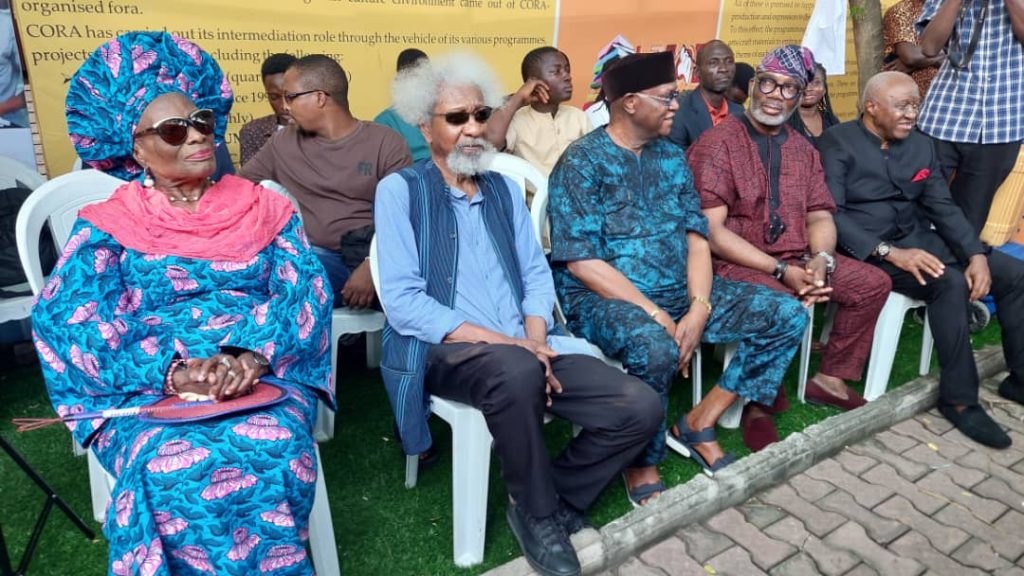
Dame Taiwo Ajai-Lycett (left); Prof. Wole Soyinka; Prince OmoobaYemisi Shyllon; Kola Peters Dopamu adn CORA Chairman, Chief Kayode Aderinokun PHOTO: LADY EJIRO UMUKORO
Shyllon also went on to list his three heroes to include Soyinka, late jurist Bola Ajibola and CORA, adding, “There are two heroes of mine who are living and there is one that is gone. My middle hero is seated in front of me, and he was just 32 years old when he risked his life for this country and he has done it so many times. I just hope Nigeria can recognize her heroes. I’m happy seeing what CORA is doing today to him. There is another hero of mine. He was Justice (Bola) Ajibola, and he was an attorney general of this country and the president of the Nigerian Bar Association. But this (Soyinka) is my own living hero. He has done so much for my country. The third hero I want to recognize is CORA, led by the great Aderinokun, Akinosho and Jahman (Anikulapo). I don’t know how you guys do it, but I want to tell you that I buy into your programme. You are helping us do what others should be doing but are busy looting. We are very grateful, and I’m hereby declaring publicly that I’m going to be a partner, starting with a donation of five copies of my own book.
“There’s a book that I want you to have in that library. We need to know our history and who we are, so we can plan better for the future. There’s a book titled Idan: The Legends of the Ages by Oladele Olusanya, and I’m donating five copies of this book to CORA for this library, so that young ones can come and know the history of Lamurudu to the fall of the Oyo Empire. So that you can take pride in being the children and the great-grandchildren of the great empires of Africa.”
In his remarks, Akinosho said it was the need to engage with the ideas in books that led CORA to form a book festival rather than a book fair or literary festival, so ideas in books could be examined a lot more closely and thoroughly. He also hinted at the marginalisation books currently suffer among the various cultural expressions that find exhibition outlets that take place all over the city of Lagos. It is the need bridge this gap that inspired CORA to further intervene with its BookTrek and the newly opened library. The intention is to expand the library space in the city to accommodate more book reading events since “Nigerian writers simply keep their books in storage in their houses,” according to Akinosho.
“We would run a Book Festival (and not a book fair), so we could have a number of programmes in which people are actually engaging with the contents of the books,” Akinosho told his guests. “Just as we didn’t want a book fair, which is about the publishing trade, we also didn’t want a literary festival, which is more about elite writers talking shop and not necessarily speaking to the material in book contents.
“We had always recognized that a once-in-a year event will not tackle the entrenched challenges of literacy in Nigeria. The plan was initially for 12 City Libraries in the country’s six geopolitical zones. Then we moderated it to Six City Libraries in Lagos. So the Library and BookTrek will be running programmes all year round. The BookTrek is an extension service idea, where we would engage authors year-round in all the six libraries in several nodes of Lagos.
“It’s also a Lifestyle advocacy; just as you can walk into a gallery (there are at least six exhibitions currently going on in several parts of Lagos as I speak), so also are there concerts (there’s a classical music concert at MUSON Centre every other Sunday evening); The Freedom Park hosts at least two concerts every weekend. So there should be readings. Book readings. For all intents and purposes, the BookTrek is a lifestyle advocacy: If I can wander into a musical concert uninvited, visit an art exhibition, or see a drama performance by merely buying a ticket, why can’t I join in a session of book reading? Why can’t I open The Guardian and, in the same space where the Culture Diary is publishing a list of exhibitions, I see A Book Reading at Ajangbadi, or Yaba, or Festac, and determine: when I leave the book reading, I will go and see the exhibition.”
Akinosho then declared 2024 The Soyinka Year, as the Nobel laureate will turn 90 on July 13, 2024, and commended him “for being who you are; we thank you for the persistence, the insistence, the moral courage!”
Two young authors Efe Roland Kalegha and Munirat Shitta-Bey donated their copies of their books titled Lucy, Mummy’s Pet and SEE respectively to CORAVille Library and Resource Centre. The books were received by Soyinka on behalf of CRA. Children performers from Kings and Queens Academy troupe also spiced up the event and held Soyinka and other guests enthralled by their performances.

